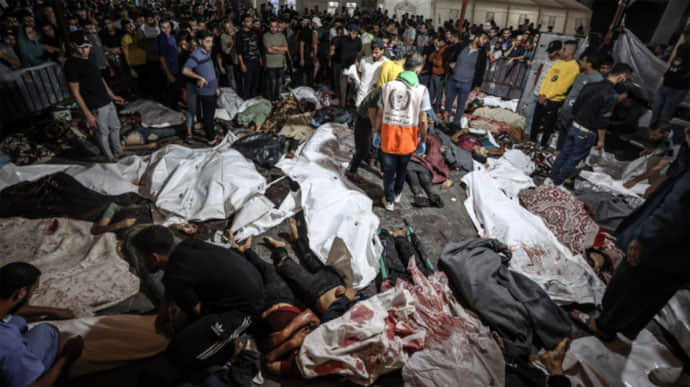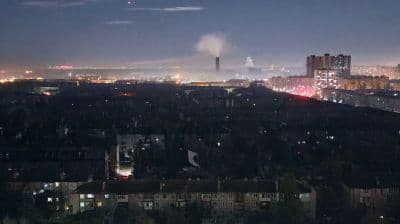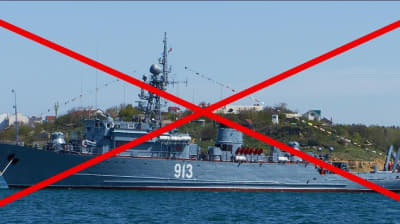Explosion in Gaza hospital caused by rocket, not Israeli airstrike – CNN

CNN has reported, based on its investigation, that the explosion at a hospital in Gaza on 17 October was presumably caused by a rocket fired from the Gaza Strip, not an Israeli air strike.
Source: CNN
Details: CNN noted that it had analysed dozens of publicly available images and videos, as well as satellite images, together with a number of experts, and had received some clues as to what caused the explosion.
Quote from CNN: "Without the ability to access the site and gather evidence from the ground, no conclusion can be definitive. But CNN’s analysis suggests that a rocket launched from within Gaza broke up midair, and that the blast at the hospital was the result of part of the rocket landing at the hospital complex.
Weapons and explosive experts with decades of experience assessing bomb damage, who reviewed the visual evidence, told CNN they believe this to be the most likely scenario – although they caution the absence of munition remnants or shrapnel from the scene made it difficult to be sure. All agreed that the available evidence of the damage at the site was not consistent with an Israeli airstrike."
Details: In particular, CNN drew attention to a flash of light in the dark sky that illuminated Gaza on the evening of 17 October before the explosion.
Footage from an Al Jazeera camera located in western Gaza and facing east, which was broadcast live on the channel, showed a rocket fired from Gaza moving in an upward trajectory at 18:59 local time, then changing direction and exploding, leaving a short bright streak of light in the night sky over Gaza. Moments later, two explosions are seen on the ground, one of which occurred near the Al-Ahli Baptist Hospital.
By checking the position of the camera, CNN was able to determine that the rocket was fired from an area south of Gaza. Footage obtained from a webcam in Tel Aviv pointing south towards Gaza, which CNN synchronised with Al Jazeera's live feed, shows a rocket salvo from Gaza shortly before the explosion.
Several weapons experts told CNN that the Al Jazeera video shows the rocket burning in the sky before exploding on the hospital premises, but CNN could not say for sure that the two incidents were related due to the difficulty of calculating the trajectory of a rocket that misfired or changed course during flight.
Quote from Markus Schiller, a Europe-based missile expert who has worked on analysis for NATO and the European Union: "I believe this happened – a rocket malfunctioned, and it didn’t come down in one piece. It’s likely it fell apart mid-air for some reason and the body of the rocket crashed into the car park. There, the fuel remnants caught fire and ignited cars and other fuel at the hospital, causing the big explosion we saw."
Details: Cedric Leighton, retired US Air Force colonel, a former deputy director of the US National Security Agency and a CNN military analyst, said that the mid-air explosion looked like a malfunctioning rocket and added that the streak of light looked like "a rocket burning fuel as it tries to reach altitude".
There were suggestions on social media that the rocket could have been downed by Israel's Iron Dome defence system. However, experts said there was no evidence of interception by another rocket, and Israel consistently claims it does not use the system in Gaza.
Another video of the explosion, which was apparently shot on a mobile phone from a balcony and also geolocated by CNN, captured a whistling sound before the sky lit up and a massive explosion was heard.
Experts said it was impossible to draw definitive conclusions based on the sound in the video, but indicated that it did not match the sound of a bomb or a shell.
Inside the hospital, the sound was deafening. Dr Fadel Na’eem, the head of the orthopaedic department, told CNN that he was performing surgery when he heard a loud explosion. He said panic broke out in the hospital, and people initially thought the explosion had occurred near the facility, but when he came out of the operating theatre, he saw many injured and dead people and the overwhelming "magnitude of the devastation".
One local volunteer, who did not want to be named, described helping to collect the remnants of the dead in the morning, saying that people had collected six bags of dead body parts.
A freelance journalist working for CNN in Gaza visited the scene the following day, interviewed witnesses and filmed the blast radius in detail, capturing a blast crater approximately 3x3 feet wide and one foot deep. Some rocket pieces and damage were visible over a wider area, including burned cars, marked buildings and broken windows.
Eight weapons and explosives experts who reviewed CNN's footage of the scene agreed that the crater's small size and extensive surface damage were inconsistent with an aerial bomb that would have destroyed most facilities at the strike site. Many said the evidence pointed to the possibility that a rocket caused the explosion.
The media writes that it is difficult to establish the direction from which a weapon was launched without data on the exact type of weapon that formed the crater. However, wreckage and ground markings point to several possible options.
There are dark spots on the ground, diverging in a southwesterly direction from the crater. The trees behind it were burnt, and a lamppost was completely toppled. In contrast, the trees on the other side of the crater remained intact, even with green leaves.
"This would be consistent with a rocket approaching from the southwest, as rockets scorch and damage the earth on approach to the ground. If the munition was artillery, however, these markings could indicate it came in from the northeast, spewing debris to the southwest. But if the projectile malfunctioned and broke apart in the air, as CNN’s analysis suggests, the direction of impact reflected by the crater would not be a reliable finding," the media writes.
CNN also analysed an audio recording released by Israeli officials, in which they say Hamas militants are discussing the blast and attributing it to a rocket launched by Islamic Jihad from the area of the "cemetery behind the hospital." At the same time, the media studied satellite images a few days before the strike and did not find any obvious evidence that there was a launch site for the rocket. It also said that CNN could not verify the authenticity of the audio intercept.
The IDF also posted a map showing that the rocket was launched several kilometres from a southwesterly direction, with its flight path pointing toward the hospital. The map is not detailed, but it points to the location of the rocket launch, which coincides with what CNN has previously identified as a Hamas training ground.
Satellite images from the site indicate some activity in the days before the explosion at the hospital, but CNN could not determine whether the rocket was launched from there.
Chris Cobb-Smith, a weapons expert, said a lot would depend on what remnants were found in the wreckage to determine who was responsible for the hospital explosion.
Quote from Cobb-Smith: "We can analyse footage, we can listen to audio, but the definitive answer will come from the person or the team that go in and rummage around the rubble and come up with remnants of the munition itself."
Details: Meanwhile, CNN says that getting independent experts there will be difficult, given the ongoing war and Israel's looming offensive in Gaza.
Former defence intelligence analyst and UN war crimes investigator, Marc Garlasco, says there are signs of a lack of evidence at the Al-Ahli Hospital site.
Quote from Garlasco: "When I investigate a site of a potential war crime the first thing I do is locate and identify parts of the weapon. The weapon tells you who did it and how. I’ve never seen such a lack of physical evidence for a weapon at a site. Ever. There’s always a piece of a bomb after the fact. In 20 years of investigating war crimes this is the first time I haven’t seen any weapon remnants. And I’ve worked three wars in Gaza."
Background:
- Hamas militants have claimed that Israel carried out an airstrike on the Al-Ahli Arab hospital in the Gaza Strip, where hundreds of people are believed to have died, all the while the Israel Defence Forces (IDF) assert that the explosion occurred due to an unsuccessful launch of a Hamas missile.
Support UP or become our patron!







